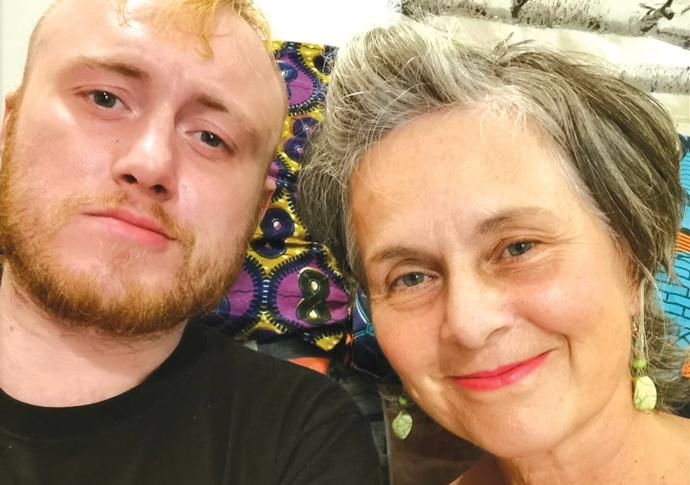‘Decriminalise drugs for addicts’ plea
Grieving family mourn man who ‘did not fit into any of the boxes that social services or health care want you to be in’
Friday, 25th August 2023 — By Anna Lamche

Constantine ‘Costya’ Somerville with Antonia Rolls
SUPERVISED drug consumption rooms, long-term inpatient support and drug decriminalisation could help those suffering with “complex” substance abuse issues, a grieving family has said.
Constantine Somerville, known to his family as “Costya”, was found dead in his King’s Cross flat in February. He was 29. Originally from West Sussex, he moved to London as a teenager and had lived for a time in Soho.
On Tuesday a pre-inquest review at St Pancras Coroner’s Court heard Costya had died from heart failure and a lung infection, with methamphetamine use as a possible contributing factor.
After the hearing, Costya’s sister Lexi Levens said: “At the root were his mental health issues, and he never got the support. The biggest thing leading up to this, and where we as a family felt that he was being failed, is because he did not fit into any boxes… Costya was very complex. He had mental health issues, he had autism, he had physical disabilities, which were brought on mostly by his prescribed addictions.”
Ms Levens, an NHS nurse, added no single person had oversight of Costya’s care “because he did not fit into any of the boxes that social services or health care want you to be in… meanwhile, his life just got more and more out of control”.
The family now argue for the decriminalisation of drug use, which would allow those with dependencies to access support without the fear of facing criminal charges.
Ms Levens said: “There needs to be more community services, more understanding, less stigma.”
Ms Levens supports the idea of supervised drug consumption rooms, and argues in favour of health care institutions capable of offering wrap-around, “long-term supervision and support” to inpatients with complex problems, as well as dedicated “mental health A&Es”.
“I don’t think the answer was ever to put someone in a flat, give them some money and then shut the door,” she said.
Costya’s aunt Maddy Pook, who also works in the health service, said: “There are barriers that mean you can’t access services if you are using drugs. You can’t even have an assessment for autism and ADHD – where they’ve got massive waiting lists – if you are drinking more than 16 units a week as a man. If you put on the form that you are drinking more than that, they’d knock you off the list, and say you have to go to alcohol rehabilitation.”
Costya was “a very different, complex character with a huge mind,” according to his mother Antonia Rolls.
His autism meant he “always felt very different from everyone else. I think his feeling that he didn’t belong in the world somehow, that he was always very different, led him to try and find relief”.
As a teenager Costya became addicted first to alcohol and later to prescription painkillers, including oxycodone, after an infection of the spine left him in hospital. This proved a gateway into the use of other street drugs.
Ms Rolls said society came to view him as “a pest, he was a problem, he didn’t deserve anything, he was an addict, he was a dirty low-down scum… but he wasn’t. He was so beautiful, and he was so worthy, and there was nothing for him.”
Any attempts to detox using the replacement opioid methadone ended in failure.
“He was expected to go to a methadone clinic and get his prescription and take it at certain times. Addicts are crazy people that don’t have timings.”
Ms Rolls, who is an artist, has spent the last few years producing an exhibition titled Addicts And Those Who Love Them, which was until recently at the Edinburgh fringe.
She is now seeking somewhere locally to exhibit her work.